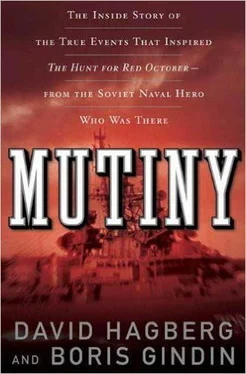“If we can get out of here we’ll find the captain; he’ll know what to do,” Gindin says.
“If they haven’t killed him,” someone counters. “Or if he’s thrown in with the mutiny, and is just lying low.”
Some of the others start to object, but Vinogradov holds up a hand to silence them. “Shut up and listen to me. The captain would never go along with a crazy scheme like this, no matter how convincing Sablin is.”
No one says a thing,
“Has anyone seen him this afternoon?”
Still no one says a word. The compartment is absolutely still. They all understand that their lives hang in the balance of a great number of factors, most of which are totally out of their control.
“Maybe Sablin shot him and hid his body somewhere,” Vinogradov suggests.
“That’s not possible,” Gindin says.
“How do you know, Boris? How can you be sure? Are you willing to bet your life, all of our lives, on Sablin’s kindness? If he’s killed the captain, what’s to prevent him from killing us all?”
“I don’t know anything for sure,” Gindin admits. “Except that unless we get out of here we’ll never know.”
“If we try to escape, what will our chances be?” one of the officers asks.
“I don’t know that, either,” Gindin says. “But I know for sure that unless we try our chances will be zero.”
The sonar supply compartment is actually two small rooms, equipped with only one work bench, a small closet that contains the power supplies, repeaters, targeting computers, and other electronic equipment that supports the sonar stations, and drawers that contain some non-classified schematics, a set of spare parts and a few screwdrivers, socket sets, and other small maintenance tools and testing gear.
At this point there is no phone in the compartment, nor is there any way in which to signal someone else aboard the ship, other than by banging on the light blue steel bulkheads.
The second, somewhat smaller compartment contains only more built-in drawers that hold more tools and test equipment and some technical manuals, which are supposed to be kept three decks up in the library.
Gindin steps through the open doorway into this compartment and almost immediately spots a water pump bolted to the deck in one corner. Pumps like these are located throughout the ship to move potable water from the tanks below to the various compartments where it’s needed. The designers placed the pumps wherever they saw fit in order to minimize the lengths of pipe runs. It is one of those Soviet economy measures that aren’t very elegant and don’t look good but work.
Some errant thought enters Gindin’s mind from way back. It’s a lecture or a discussion at the academy about sabotage, what to look for, how to spot it, and how to prevent it. “This was a new territory for me,” Gindin says. “My job was always to make sure that all the mechanical systems aboard the Storozhevoy worked the way they were designed to work. Thinking about how to prevent Sablin from getting away from Riga by maybe sabotaging the ship was alien to me. And frightening.”
The mood among the crew is high with enthusiasm, but Sablin carries a tight knot in his gut. So many things can still go wrong with his plan that he can’t help but stop for a moment to reflect on just what it is that he has set in motion this evening. Two hundred officers and men are depending on him to get them through this ordeal. The burden is on his shoulders.
Sablin may be an idealist, but he’s far from being a stupid man. He knows that he will have one shot, and only one shot, at surviving this business. If he can convince the Russian people themselves to rise up in revolt, the Kremlin will be all but powerless to stop what he believes will be a groundswell—just like the revolt that toppled the tsarist government in October 1917.
He has worked out a plan for that.
Almost as soon as he had formulated his idea for the mutiny, Sablin began working on a speech that he would broadcast to the Russian people. He has recorded it, and once the Storozhevoy is in position near Leningrad and he has been given access to Russian radio and television, he means to broadcast his plea directly to the people. “… our announcement is not a betrayal of the Motherland, but a purely political, progressive declaration, and the traitors to the Motherland are those who would seek to stop us.
“My comrades want me to pass on to you our assurance that if our nation is attacked, we are fully prepared to defend it. Right now we have another goal: to take up the voice of truth …”
But first he has to get away from Riga and the rest of the fleet, and to do that he has to make sure that the ship is secure. For that they will need weapons.
The warshots for all the Storozhevoy’s combat systems—the rockets, depth charges, and ammunition for the deck guns—have already been off-loaded before he heads to his refurbishing berth. This is routine. But the ship has two armories of light weapons, mostly pistols and AK-47 assault rifles.
Sablin got a set of keys for one of the armories from their starpom Nikolay Novozilov, before the exec went home on leave. Now Sablin takes a few of the enlisted crewmen with him, and they retrieve all the weapons and ammunition they can carry.
Then he begins issuing the orders crucial for their survival until they can slip their mooring and get out into the open Baltic. First he posts two armed crewmen on the bridge to make sure that not only the ship’s controls are theirs but also that no one can sneak up and use the radio to call for help.
Next he sends several crewmen belowdecks to help Shein make sure no one tries again to release the captain. Sablin sends others to the sonar compartment where Gindin and the others who voted with the black backgammon pieces are under arrest and one young man with a rifle to guard his cabin.
At this point Sablin has every right to be paranoid, but he wants to prevent someone trying to find the recording of his speech and destroy it.
Finally, he sends men from each division to watch over their own equipment. Among them are several from Gindin’s gas turbine division who have as much enthusiasm for the project as everyone else.
“No matter what happens, you must keep in control of the engine room,” Sablin tells the kids who are by this time jumping all over the place.
They want to tell their stories about how rotten things are at home and how once they get back everything will be better.
“Of course life will get better once we have elected some proper leaders,” Sablin assures them. “But for now no one gets to the engines unless I give the order.”
“Yes, sir,” they chorus.
“Once everything is secure down there, I want you to get the engines ready to start on an instants notice. Can you do this?”
One of them nods. “Yes, of course. Our lieutenant is a good man; he taught us—” The kid stops in mid-sentence, a little embarrassed by the betrayal of an officer he actually admires.
“I understand,” Sablin says. “None of them will come to any harm. Anyway, this is just as good for them as it is for us.”
The embarrassment passes. They’re eager to begin.
“As soon as you’re ready, call me, or send a runner,” Sablin tells them. “Now go, and be careful.”
Sablin watches them with real affection as they scurry belowdecks to carry out his orders. He is alone for just that moment, and perhaps he listens to the sounds of the Storozhevoy. His ship now. An instrument, like the Potemkin, for a nation-changing revolution.
It’s chilly up on deck, in the open, and the fog has thickened. He might think that he is alone at this point in time. Not one person aboard this ship has any real idea what he is trying to do for them, for the Rodina. Nor, he supposes, will they understand what has happened even after it is all over with and the revolution has come and gone. Only afterward, when their lives have become materially better, might they stop from time to time to think of what part they played this evening.
Читать дальше












